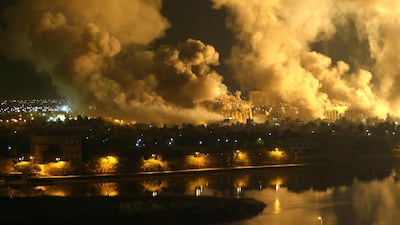With the fall of Ramadi to ISIL, the Republican contenders for next year’s US presidential election have been under ever more pressure to put forward their ideas on how to contain or vanquish the extremists in Iraq and Syria. Varying from sending in 10,000 American troops to do the fighting that the Iraqi army appears to be reluctant to engage in to air-supplied “shock and awe” Mark II, they nearly all sounded suitably bellicose. The exception was the ever-interesting Sen Rand Paul, who raised the pertinent question: “Is it a good idea to topple secular dictators? And what happens when we do?”
The Republican field had already been tested on their views of the invasion of Iraq in 2003. The replies of former governor Jeb Bush caused some hilarity, as he initially said he would have done the same as his brother, President George W Bush, before saying that the question was “hypothetical” and then finally settling on what he probably wishes he’d said to begin with: “Knowing what we now know … I would not have engaged. I would not have gone into Iraq.”
The political arena in America echoes to this mantra. The intelligence was faulty. The war was a mistake. Oh dear. Well, if only we’d known …
These responses appear to chime with an American public weary of military adventures that they expected to result in swift victories. But their tone ought to be absolutely unacceptable.
The invasion of Iraq took place on the basis of evidence that was concocted, irrelevant or unproven. It was led by the US and pushed for in particular by vice president Dick Cheney.
This war was unjustified. It was illegal, in the opinion of many – including the then UN secretary-general Kofi Annan – and it caused the deaths of hundreds of thousands of Iraqis, a near constant state of virtual or actual civil war, and the disintegration of what had previously been a fairly stable – albeit brutal – country with high levels of living, healthcare and education.
This was a human, cultural and geopolitical catastrophe. Yet those who would be the next US president talk about it in dismayingly mild language. It is as though it was a regrettable error, but nobody’s fault, really, like a small domestic accident caused by a forgivable lack of awareness: “If I’d known you’d just had your normally filthy carpet dry cleaned, I wouldn’t have walked in wearing muddy boots.”
Except in that instance, the one committing the mistake would almost certainly say: “I’m terribly sorry.” But who, in America, has actually apologised for the devastation the US-led coalition has wrought?
Hillary Clinton has admitted that she “got it wrong” in voting for the war. But what could she have done? She “made the best decision I could with the information I had”. George W Bush admitted in his memoir, Decision Points, “I had a sickening feeling every time I thought about” the failure to discover weapons of mass destruction in Iraq. But far from apologise, he won’t even admit the invasion was a mistake, writing in the same book: “Imagine what the world would look like today with Saddam Hussein still ruling Iraq. He would still be threatening his neighbours, sponsoring terror and piling bodies into mass graves.”
Instead, of course, it is ISIL that is doing that – arguably on a far greater scale and with vastly more destabilising consequences. And that group of extremist murderers would not exist without the Iraqi state having been destroyed, first by the physical firepower and bombs of the US-led invasion, and second by the wanton dismantling of the Baathist institutions that might have maintained a teetering normality.
Sen Paul is quite right to ask just what benefit the rest of the world has got from the toppling of secular dictators. They may have tortured and beaten their populations into submission, but the chaos that has followed in several countries has been far worse.
We may have grown used to the evasions of the warmongers and their successors, but it is worth pondering their shameless lack of contrition. While Mr Bush and Mr Cheney might still argue that Saddam should have been removed regardless of the WMD issue, almost everyone at the top of US politics now accepts that the intelligence was faulty (even while there is also the question of how many members of Congress actually bothered to read the full version of the intelligence report that was supposed to guide their vote).
Rather than a metaphorical shrugging of the shoulders, it should be absolutely devastating that most of the top US leadership now agrees that the war shouldn’t have taken place. There should be the most humiliating self-abasement and abject apologies to the people of Iraq.
If the countries of the coalition are not held to account for the actions of their former governments, it is tantamount to the de facto acceptance of a truly appalling calculus – one that basically says: Iraqi lives weren’t worth all that much anyway, and that’s why we’re not going to make a proper apology and compensation.
Is that the real view of the developed Anglosphere – that somehow they are above being held responsible for the consequences of their policies on the populations of less developed, non-western nations?
I would hope not. But “sorry” has so far truly been the hardest word.
Sholto Byrnes is a senior fellow at the Institute of Strategic and International Studies, Malaysia


